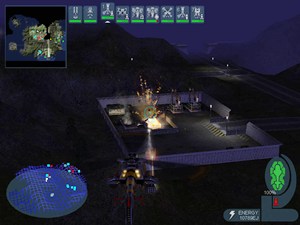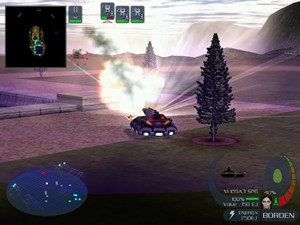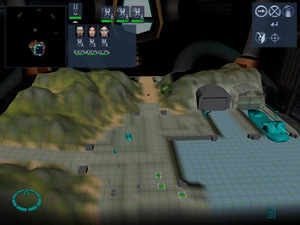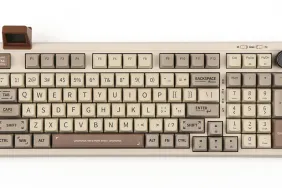Urge to play rising…rising…
Interplay’s latest strategy title, Hostile Waters: Antaeus Rising, is easy
to grade but almost impossible to describe. In a way, it’s like an interactive
movie in the best sense of the term. Built around an engrossing, well developed
plot, Antaeus Rising puts you in command of a scuttled carrier which had
been forgotten off the coast of an island in Oceania.
It’s the year 2032 and nano-technology has transformed the world. War has been
forgotten and science, industry and healthcare are thriving. Earth is a utopia…until
a group of generals and captains of industry (disgruntled because they have
nothing to do now) start blowing cities back into nanodust. Sadly, the world’s
governments are no longer prepared to deal with a large scale war, and are forced
to try and rebuild the only remaining nano-carrier on the planet.
The good news is that since the carrier (dubbed ‘Antaeus’) uses nano-technology,
it can convert almost anything it encounters into building materials to repair
itself and build a fleet of tanks and helicopters. In addition, as you discover
new technologies you will be able to design increasingly unique units that are
tailored to specific kinds of combat. The bad news is that the Antaeus is almost
completely crippled, crewless, and under attack when you take command.
Fortunately, you don’t actually need a crew – you can resurrect the Antaeus’
original one. The minds of the Antaeus’ best and brightest have been preserved
in microchips called “Soulcatchers.” Almost any unit that you can design can
be equipped with a Soulcatcher unit, and then you can assign one of the resurrected
crewmembers to that unit. Creepy, but effective.
If you match the right crewperson to the right unit, it will pay off in spades.
The pilots and tankers assigned to the Antaeus really know their jobs, and they
are the best wingmen I have ever had in a PC game. Watching the pilots bob and
weave to avoid missile fire or use terrain to sneak up on a target is a real
treat.
In fact, the AI is sufficiently strong that you can play the entire game without
taking advantage of one of Antaeus’ coolest features: being able to take control
of one of your units and get into the thick of battle. This sets Antaeus
apart from other RTS games, though it has been tried in past efforts like Uprising.
When you move into the 3D view, the graphics are gorgeous and are certainly
comparable to what we have come to expect from a first-person shooter. The actual
combat is pure arcade action. Shoot them before they shoot you, and remember
that there are a lot more of them.
Jumping into one of your units also allows you to see the battlefield up close
and make command decisions in real time. I use the helicopter solely for this
purpose. I’ll jump in and select targets for my units and then provide roving
cover where needed. The interface for giving orders and marking waypoints is
extremely intuitive, and is the same whether you are on the map screen or using
the first person view.
The types of strategy that will work for various missions is almost completely dependent on your play style. If you can secure a large area and process its raw materials, you will be able to crank out new units as fast as the old ones are destroyed. Since the only place you can produce units is the carrier, however, you may not be able to get your units back into the thick of battle very quickly. On the other hand, you can take a covert ops approach and try to surgically accomplish your mission goals with minimal casualties.
 Sadly,
Sadly,
the mission scripting assumes that you cannot figure this sort of thing out
for yourself and tends to walk you through the golden path to success in each
mission – whether you want it to or not.
Of course, much of the scripting in those missions is intended to further
the plot of the game, which is a pleasant change from having the plot exist
solely to provide an excuse for the action. Fans of a good story will find that
the scripted events, cutscenes and professional voice acting are just as engrossing
as the first-person gameplay. In this regard, Antaeus hopefully offers
a glimpse of how developers will be looking for new ways to create fun, engrossing
experiences that do not fit easily into a particular genre.
Which Antaeus certainly does not. With only a few units (up to eight)
under your control at a time, it’s not a typical RTS game. Yet with a hefty
strategic element and the requirement that you rely on your team’s excellent
AI, it’s not a first-person shooter.
Too bad it’s not more things as well, since there is no multiplayer or random
scenario generator. Antaeus is only what you make of the plot and the
21 (very time consuming) missions. Though the story is strong enough to carry
the game, this kind of experience is just screaming for multiplay and the omission
is odd.
Antaeus is best taken as what it is: an experience. It is a graphically
beautiful, fully engrossing story that lets the player take the role of combatant
and commander. If, in this kind of game, you tend to zip through missions only
once without playing with different strategies or fully exploring the scenarios
or the maps, Antaeus is probably not for you. On the other hand, if the
multi-layered change of pace appeals to you, the richness and quality of the
limited gameplay make the game well worth the price of admission.

-
Excellent Production Values
-
Clever, Challenging Gameplay
-
A Real, Honest-To-Gosh Story!
-
No Multiplayer
-
No Random Scenarios/Sandbox











